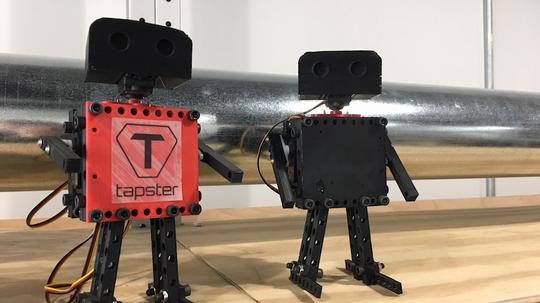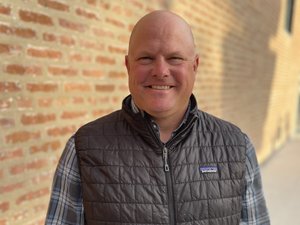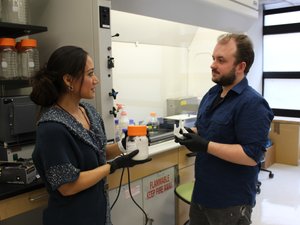
On a quiet street in west suburban Oak Park, robots are making robots.
3D printers, lined along the left side of a modest 800-square-foot office space, are buzzing as they assemble parts that will ultimately make up the machines sold by local robotics startup Tapster.
Tapster doesn't make the type of robot that you probably picture in your head. These aren't pick-and-place bots designed for the manufacturing floor, or the creepy Boston Dynamics robot that can do backflips. Tapster's robots have essentially one job---tap a touchscreen over and over again.
Jason Huggins, Tapster's CEO and founder, brought me over to a table where one of these finger-pointing bots is in action. He's programmed the robot to play the Harry Potter theme song on the piano via Garage Band on an iPhone. Even with just one finger, the robot sounds pretty good.
Huggins built the first Tapster robot in 2011 as an “art project," and he gained some YouTube fame when he taught a robot to play Angry Birds. He started selling the devices online to hobbyists and other tinkerers who wanted a robot that could tap a touchscreen.
But starting around 2014, Huggins realized that robots that poke screens could potentially be a serious business opportunity. With screens becoming a major part our lives, from phones to watches to automobile center consoles, companies need tools to test the programs that run on all these devices. Since asking a human to repeatedly tap a touchscreen until an app malfunctions isn't an option, Tapster became a viable solution to automate testing of these devices.
Among the early Tapster customers was Mercedes-Benz, which bought 10 Tapster robots to test its self-parking car app and has been a repeat Tapster customer since. Huggins said the automotive industry has been a big part of the company's revenue stream, selling to "tier 2" suppliers of infotainment units and other touchscreen makers that sell to the major car companies.
Car makers, sensing pressure from Silicon Valley tech companies, are now scrambling to become software companies themselves. And they need equipment to test all of their new touchscreen devices inside their automobiles, Huggins explained.
"If [car makers] don’t push things forward, Apple will, Google will, or Tesla will, and they'll be left behind," he said. "All the car companies are trying to figure out how to stay relevant."
Medical device companies and point-of-sale system makers (think touchscreen tablet devices at your local sandwich shop) have also purchased the company's bots. Even the National Security Agency has seen a need for Tapster's robots, displaying the devices at their booth during this month's U.S. Science & Engineering Festival in Washington, D.C., though Huggins declined to elaborate on what relationship the startup has with the NSA.
Huggins said that all of the big-name cellphone makers have purchased robots from Tapster, which live inside their R&D testing labs.
"Any big company that makes a phone, they’ve bought one or two of them," Huggins said. "I’ve got my robots in lots of secret robot labs all over the globe."
Huggins knows a thing or two about testing. He created Selenium, a software testing tool for web browsers and applications, and was hired by Google, where Selenium was used to test things like Gmail and Google Maps. Then in 2008, he co-founded Sauce Labs, which basically took what Selenium was doing for Google but made it available for other startups looking for software testing. And in 2013 he was called on to help fix the government's broken Healthcare.gov site.
Tapster has found a niche in the robotics space that not many other startups have entered. Its competition is mostly industrial robotics companies that charge upwards of $100,000 per robot (Tapster sells its devices for just a fraction of that cost), and do-it-yourselfers who create their own automated testing devices.
What Tapster sells isn't just tapping robots, but the consulting and the software development expertise Huggins can bring to the customer. Tapster can also provide customized robots to fit the type of hardware testing a company needs.
Tapster has raised a small amount of outside funding from Indie.vc, a fund that invests in startups that are focused on revenue and profitability first. Just a team of two, the company has done a couple hundred thousand dollars in sales. Huggins said he plans to grow the business through revenue, not venture capital, bucking the funding path that many startups head down.
"We’re growing, but in a slightly more conscious, organic way," he said.








